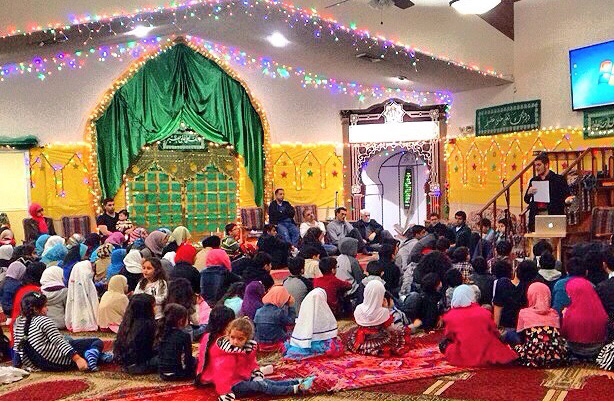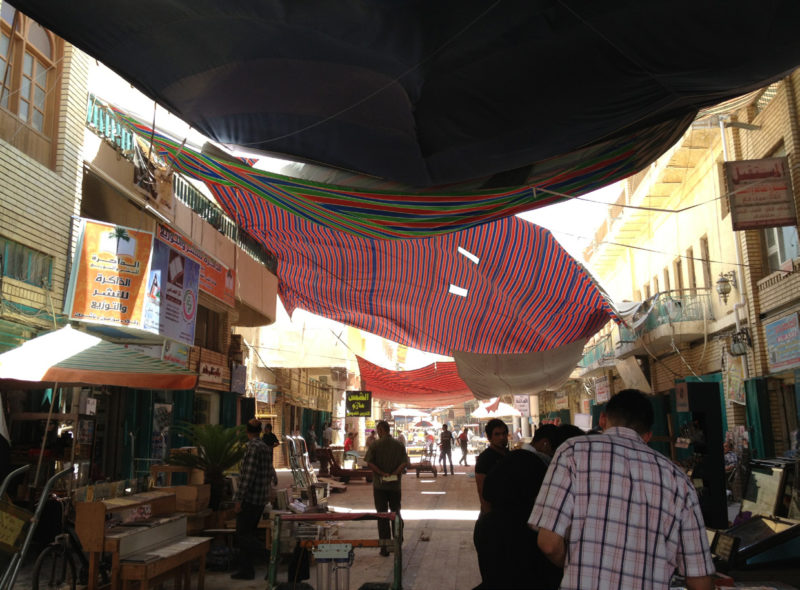The Masjid was the place where I would turn to when I felt a need for a community. We differed in some thoughts, but at the end of the day we shared similar experiences, desires, goals and struggles. But however welcoming the center felt, it did not build an armor for us to fend the outside world. We learned about our heritage, customs; we attempted to perfect our language and etiquette, but we lacked the discussions and debates, the space to ask questions and, most importantly, the space to build independent personalities, ready to survive real world challenges outside the Masjid walls.

Between prayers in Sunday school at the Islamic Message Foundation in Metairie, Louisiana. Photograph by Farah Alkhafaf.
Part of the issue is that our masjid does not have a resident Imam. Instead, the Board often hires local Sheiks from neighboring states such as Florida and Tennessee to spend a couple of days in our community when religious occasions and anniversaries arise. One Sheik diagnosed the community and stated, “Rich in culture and hard-working people. The individuals before me cannot be found anywhere else in America in terms of pride and generosity. But a mosque without an Imam is like a clinic without a doctor. Do not deprive your children from one. You must find a spiritual leader in which questions can be answered, programs are monitored by a certified scholar. You need a resident Imam to ensure the youth’s success, and particularly as they are getting older and their lives are becoming more complex.” His words remain with me to this day, and always console me. “This is where our role starts. We need to show the true Islam and tell others we are not what you hear in the media.Look at us, we are Islam.”

The oldest area of Baghdad, where books are lain on the floor openly 24/7. Photograph by Farah Alkhafaf.
I don’t know what the information was like in the West years ago. Maybe those who studied everything knew what Islam was. But in my opinion, after Saddam did that problem and all the Iraqis fled, and after Syria had its problems and all of them left, and in Libya and so on… these dictators helped the people in our countries spread Islam. All of those who left their homes were hurt. But in all honesty, because of this migration, people began to know Islam in every street. Wherever we are living, our neighbors all pretty much knew about Islam. This is where our role starts. We need to show the true Islam and tell others we are not what you hear in the media. Look at us, we are Islam. We mix with everyone, give peace, we don’t side against anyone. We don’t hurt anyone. And we maintain our cleanliness and follow the rules. We are to ourselves and don’t get into conflicts with others.
 NOLAbeings Multimedia artist Claire Bangser created NOLAbeings as a portrait-based story project that marries...
NOLAbeings Multimedia artist Claire Bangser created NOLAbeings as a portrait-based story project that marries...  Voodoo in New Orleans: Reviving history: New Orleans fortune telling This article takes a deep dive into the history of Voodoo in New Orleans, its hybridization with Catholicism, and its present-day place in the city's culture. The author visits fortune-tellers in the French Quarter, using their guidance as a tool for introspection rather than a deterministic predictor of the future. Through her experiences in New Orleans, the author feels a mystical connection to both the past and the future.
Voodoo in New Orleans: Reviving history: New Orleans fortune telling This article takes a deep dive into the history of Voodoo in New Orleans, its hybridization with Catholicism, and its present-day place in the city's culture. The author visits fortune-tellers in the French Quarter, using their guidance as a tool for introspection rather than a deterministic predictor of the future. Through her experiences in New Orleans, the author feels a mystical connection to both the past and the future. 
[…] This piece was edited for content, and you can find the original here. […]
[…] This piece was edited for content, and you can find the original here. […]